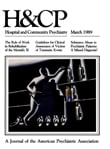Posttraumatic Stress Disorder in Victims of Motor Vehicle Accidents
Abstract
All of the patients with PTSD brought on by motor vehicle accidents who were involved in prolonged treatment with the author returned to driving, although not with the same level of calmness and efficiency they had expenienced before their accident. With a few exceptions, all returned to work. They reported that keeping busy was an essential distraction from their posttrauma thoughts.
Although PTSD patients involved in long-term treatment can appear normal, significant tional impairments may persist. Restricted sexual activity, impaired assertiveness, and avoidance of conflict are common residual problems. Some patients may remain susceptible to exacerbations of PTSD symptoms in response to intercurrent stress from any source. Consequently, difficulties in the patients' work and family life may develop. Ongoing treatment, using active medication management and psychotherapy, is necessary to reduce those problems. Traditional supportive techniques such as ventilation, clarification, reassurance, education, and persuasion are used.
Patients who experience PTSD as a result of a motor vehicle accident may also have grounds to seek financial compensation for damages resulting from the accident. However, when those patients were compared with patients who developed PTSD after a sudden loss and who had no possibility of being compensated, no significant differences were noted on such treatment variables as dropout rate and outcome. That finding suggests that the possibility of financial compensation does not affect the course of the disorder (3,10).
This preliminary framework for evaluating and treating PTSD in victims of motor vehicle accidents suggests directions for future formal research. For example, the incidence of the disorder, its cost to society, and the specific roles of medication and psychotherapy in its treatment need to be established.
Access content
To read the fulltext, please use one of the options below to sign in or purchase access.- Personal login
- Institutional Login
- Sign in via OpenAthens
- Register for access
-
Please login/register if you wish to pair your device and check access availability.
Not a subscriber?
PsychiatryOnline subscription options offer access to the DSM-5 library, books, journals, CME, and patient resources. This all-in-one virtual library provides psychiatrists and mental health professionals with key resources for diagnosis, treatment, research, and professional development.
Need more help? PsychiatryOnline Customer Service may be reached by emailing [email protected] or by calling 800-368-5777 (in the U.S.) or 703-907-7322 (outside the U.S.).



